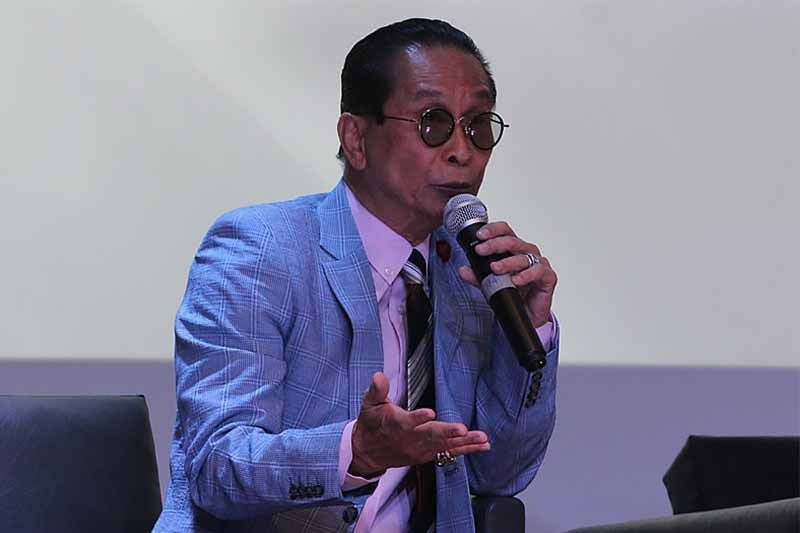Despite Panelo's claims, COVID-19 not the 'invasion' to justify martial law

MANILA, Philippines — Chief presidential legal counsel Salvador Panelo's legal theory that the COVID-19 pandemic may constitute an “invasion” that can justify a declaration of martial law drew just a short reply from former Supreme Court justice Antonio Carpio: “Hahahaha.”
Carpio, the former senior associate justice, sent the message to Philstar.com after he was asked on Panelo’s legal theory on the “evolved” definition of invasion in the context of martial law.
He did not expound further.
Panelo falsely claimed that the COVID-19 pandemic counts as “invasion,” a Constitutional requirement in declaring martial law,
In an streamed message, Panelo said there are only two grounds when martial law may be declared: In case of rebellion or invasion, when public safety requires it.
Panelo said that rebellion by the Communist Party of the Philippines-New People’s Army has never stopped.
He added that while framers of the Constitution may have only defined “invasion” to mean “forced entry of an army into a country to occupy it and make it under control,” its definition has evolved.
"You know, internationally... there is a new international meaning of invasion. It can mean the entry of a disease and the transfer from one area to another," he claimed without citing his sources.
"There is an actual invasion of the coronavirus disease. It threatens in fact the entire country" he added.
Invasion in the context of martial law
Justice Secretary Menardo Guevarra explained to Philstar.com in a text message that "invasion," in the context of declaring martial law, "refers to an invasion of a country by foreign armed forces."
"This is analogous to the other ground for declaring martial law, i.e., rebellion, which is an armed uprising against the government by its own citizens," he added.
Guevarra also said that "invasion" and "rebellion" refer to "armed actions by human beings, not by non-living things like viruses."
Rights lawyer Edre Olalia, also president of the National Union of Peoples’ Lawyers, meanwhile said Panelo’s claim is “unbelievable.”
“Legally untenable, constitutionally preposterous and factually absurd, yet an extremely perilous fable,” Olalia said of Panelo’s latest claim.
He added that “offhand, [invasion] pertains to use of armed force or in the context or conditions of armed conflict or hostilities.”
President Rodrigo Duterte last week warned that he would declare martial law if lawlessness from the NPA, the armed wing of the CPP, continues.
Panelo's legal theories
This is not the first time that Panelo has stretched the definitions in the Constitution to argue for martial law or for a military approach to issues.
In 2018, Panelo said that there was "lawless violence" at the Bureau of Customs, which, he said justified having soldiers take over the bureau.
He was, at the time, referring to a September 2016 declaration of a state of lawless violence issued shortly after a bomb went off at the Davao night market and killed 14 people.
The declaration, which is still in force, allows police to call on the military for help in suppressing lawless violence.
Proclamation 55, which declared the state of lawless violence, specified acts of actual violence like "abductions, hostage-takings and murder of innocent civilians, bombing of power transmission facilities, highway robberies and extortions, attacks on military outposts, assassinations of media people and mass jailbreaks."
It also authorizes the military and police "to undertake such measures as may be permitted by the Constitution and existing laws to suppress any and all forms of lawless violence in Mindanao and to prevent such lawless violence from spreading and escalating elsewhere in the Philippines."
Despite that, Panelo insisted that "lawless violence" also means a kind of metaphorical violence and, "not as we understand in the limited sense."
In 2016, he incorrectly claimed that the country's drug problem justified the declaration of martial law.
"The drug problem has risen to a crisis of gigantic proportion that endangers the public safety hence constitutionally a declaration of martial law is valid since there is imminent danger to the public safety," Panelo told reporters in an interview, a transcript of which was released by the Palace.
Although the constitution authorizes the president to declare martial law under certain conditions, it also holds that Congress may "by a vote of at least a majority of all its Members in regular or special session, may revoke such proclamation or suspension, which revocation shall not be set aside by the president."
President Duterte declared martial law in Mindanao in May 2017 in response the the Marawi Siege. Congress eagerly backed the declaration as well as the extensions of martial law in Mindanao until the end of 2019.
Congress, in March, readily approved a bill granting the president emergency powers to address the COVID-19 crisis.
- Latest
- Trending
































